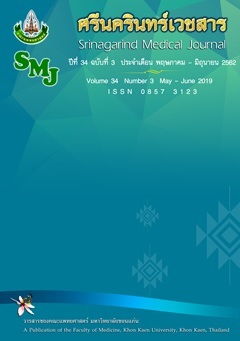Symptom Clusters and Effects of Progressive Muscle Relaxation in Thai Patients with Hepatocellular Carcinoma Undergoing Transarterial Chemoembolization
Keywords:
Progressive muscle relaxation; Symptom clusters; Hepatocellular carcinoma; Transarterial chemoembolization; NursingAbstract
Background and objectives: Symptom clusters cause suffering in cancer patients. The study of symptom clusters as well as symptom clusters management is important. Progressive muscle relaxation (PMR) is used to alleviate symptoms in cancers due to it can be performed simply and convenient. This research aimed to investigate the symptom clusters in Thai patients with hepatocellular carcinoma (HCC) undergoing transarterial chemoembolization (TACE) and to preliminarily evaluate the effects of progressive muscle relaxation (PMR) on those symptom clusters.
Methods: The study used a one-group, pre- and post-test design. Thirty participants were recruited from a university hospital in northern Thailand
Results: Two symptom clusters emerged from factor analysis. The first symptom cluster consisted of abdominal distension, upper back pain, and shoulder pain. The second symptom cluster was lower back and abdominal pain. The mean score of symptom cluster 1 and 2 from pre- to post-PMR significantly decreased (Z=-6.84, p<0.001; Z=-5.35, p<0.001, respectively).
Conclusions: It is recommended that health care providers should encourage the use of PMR in HCC patients undergoing TACE to minimize their symptom clusters.
References
2. El-Serag HB. Hepatocellular carcinoma. N Engl J Med 2011; 365: 1118-27.
3. Chonprasertsuk S, Vilaichone R. Epidemiology and treatment of hepatocellular carcinoma in Thailand. Jpn J Clin Oncol 2017; 47: 294-7.
4. Bruix J, Sala M., Lovet JM. Chemoembolization for hepatocellular carcinoma. Gastroenterology 2004;127(5 suppl): S179-88.
5. Sun VC, Sarna L. Symptom management in hepatocellular carcinoma. Clin Oncol Nurs 2008; 12: 759-66.
6. Butt Z, Mallick R, Mulcahy MF, Benson AB, Cella D, Kaiser K. Pain and other symptoms in patients with hepatocellular carcinoma (HCC): a qualitative analysis. J Clin Oncol 2013; 31(suppl): e15187.
7. Dodd MJ, Miaskowski C, Paul SM. Symptom clusters and their effect on the functional status of patients with cancer. Oncol Nurs Forum 2001; 28: 465-70.
8. Chen E, Nguyen J, Cramarossa G, Khan L, Leung A, Lutz S, Chow E. Symptom clusters in patients with lung cancer: a literature review. Expert Rev Pharmacoecon Outcomes Res 2011; 11: 433-9.
9. Chaiviboontham S, Viwatwongkasem C, Hanucharuenkul S, McCorkle R. Symptom clusters in Thais with advanced cancer. Pac Rim Int J Nurs Res Thail 2011; 15: 265-77.
10. Dong ST, Butow PN, Costa DS, Lovell MR, Agar M. Symptom clusters in patients with advanced cancer: a systematic review of observational studies. J Pain Symptom Manage 2014; 48: 411-50.
11. Kurtz ME, Kuetz JC, Given CW, Given B. Symptom cluster among cancer patients and effects of an educational symptom control intervention. Cancer Ther 2007; 5: 105-12.
12. Fox SW, Lyon DE. Symptom clusters and quality of life in survivors of lung cancer. Oncol Nurs Forum 2006; 33: 931-6.
13. Heidrich SM, Egan JJ, Hengudomsub P, Randolph SM. Symptoms, symptom beliefs, and quality of life of older breast cancer survivors: a comparative study. Oncol Nurs Forum 2006; 3: 315-22.
14. Kweekboom KL, Cherwin CH, Lee JW, Wanta B. Mind-body treatments for the pain-fatigue-sleep disturbance symptom cluster in persons with cancer. J Pain Symptom Manage. 2010; 39: 126-38.
15. Jacobson E. Progressive Relaxation. Chicago: University of Chicago Press; 1938.
16. Field T. Progressive muscle relaxation. In: Tiffany F, editor. Complementary and alternative therapies research, Washington, DC, US: American Psychological Association; 2009: 97-101.
17. Cooke H, CAM-Cancer Consortium. Progressive Muscle Relaxation [online document]. http://cam-cancer.org/The-Summaries/Mind-body-interventions/Progressive-Muscle-Relaxation. July 7, 2015.
18. Chinda M, Jaturapatporn D, Kirshen AJ, Udomsubpayakul U. Reliability and validity of a Thai version of the Edmonton symptom assessment scale (ESAS-Thai). J Pain Symptom Manage 2011; 42: 954-60.
19. Christian-Miller N, Frenette C. Hepatocellular cancer pain: impact and management challenges. J Hepatocell Carcinoma 2018; 5: 75-80.
20. Shun SC, Chen CH, Sheu JC, Liang JD, Yang JC, Lai YH. Quality of life and its associated factors in patients with hepatocellular carcinoma receiving one course of transarterial chemoembolization treatment: a longitudinal study. Oncologist 2012; 17: 732-9.
21. Jung SN, Seon JI, Kim K. The factors of pain and pain management after transarterial chemoembolization in patients with hepatocellular carcinoma. Asian Oncol Nurs 2017; 17: 107-15.
22. Park HJ, Sohng KY. Effect of positioning on back pain and comfort of bed rest patients after transhepatic arterial chemoembolization. J Korean Acad Fundam Nurs 2005;12: 317.
23. Gupta B, Kumari M, Kaur T. Effectiveness of progressive muscle relaxation technique on physical symptoms among patients receiving chemotherapy. Nurs Midwifery Res J 2016; 12: 33-40.




